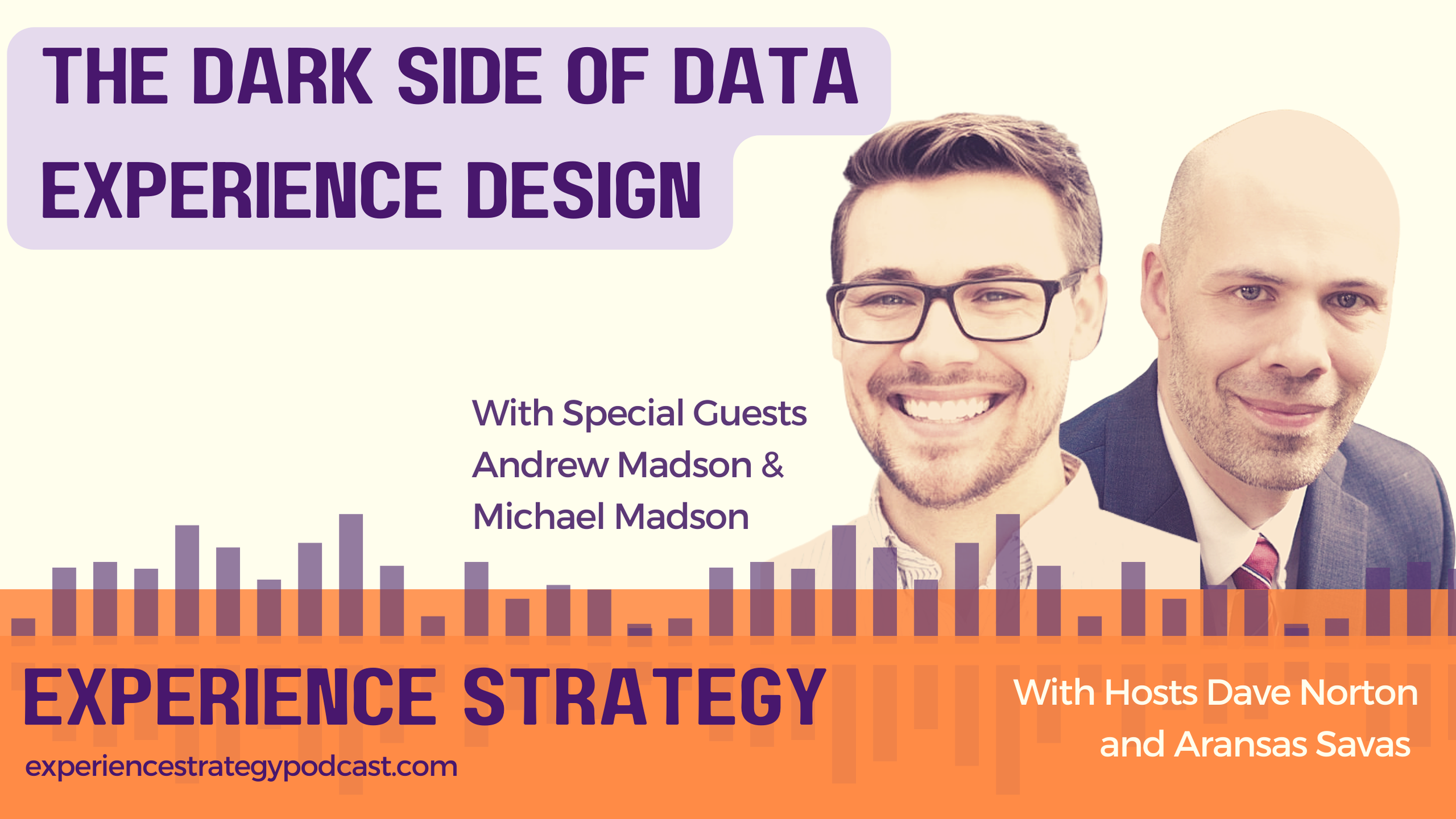Experience Strategy Podcast Newsletter: The Dark Side of Data Experience Design
To listen click HERE
In this enlightening episode, we dive into the world of data ethics and user trust with our special guests, Andy and Michael Madson. With extensive expertise in data experience design, healthcare, finance, and user experience, they shed light on the critical aspects of clear data communication and empathic listening to counter the darker implications of data usage. Together, we explore strategies for democratizing data literacy and simplifying complex data concepts to ensure transparency and trustworthiness. As we navigate the complexities of data ethics in an era dominated by artificial intelligence, you’ll gain valuable insights into how to combat the dark side of data experience design and pave the way for a more trustworthy and responsible data-driven future.
Welcome to the Experience Strategy Podcast Newsletter! Like our popular and long-running Experience Strategy Podcast, this newsletter is dedicated to those who design, manage, and lead experience strategies for companies large and small. Our big purpose is to catalyze the growth of experience strategy by sharing the tools, techniques, and ideas that are used by the most impactful teams and companies.
In each newsletter you’ll find practical, actionable concepts, drawn from our most popular podcast episodes, that you can use to serve your customers, employees, and company.
In the rapidly evolving business world, where data and artificial intelligence are taking over, the field of data experience design emerges as a potent force. However, it comes burdened with ethical and trust-related complexities making it imperative for experience strategists to grapple with the challenges posed by data usage. In today’s episode, we have the privilege of speaking with two distinguished guests, The Madson Brothers - Andrew and Michael Madson. These siblings bring a wealth of wisdom and experience to the domains of data experience design and artificial intelligence. Andrew C. Madson is a seasoned data science professor, and founder of Analytic Access, with a background enriched by years of educational and consulting endeavors. Meanwhile, Michael Madson, is an accomplished assistant professor specializing in user experience and technical communication at Arizona State University, adding another layer of expertise to our discussion. Join us as we explore the realm of data experience design, shedding light on its successes, pitfalls, and most importantly, how we can collectively pave the way for a more prepared and ethically sound data-driven future.
What is Data Experience Design?
Data Experience Design, according to industry experts, Andrew and Michael Madson, represents a comprehensive approach that goes beyond traditional data handling. It involves seamlessly integrating data into customer experiences and business strategies, forging a harmonious connection between data and users. In simpler terms, it means using data not just to understand customers but also to predict their needs, ensuring that every interaction is personalized and meaningful. This concept has the potential to reshape how customer experiences are crafted, leading to increased satisfaction, loyalty, and business success. For experience strategists and business owners, it signifies the importance of treating data as a vital component of their strategic toolkit. It’s about understanding that using data ethically and empathically is key to building trust, respecting privacy, and delivering value to both customers and the bottom line. The real power of Data Experience Design lies in its capacity to transform data into a catalyst for innovation, differentiation, and a deeper understanding of the human aspect in the data-driven landscape.
Navigating Dark Patterns and Fostering Trust in Data
While you are on your quest to a more prepared and ethically sound data driven future, Andrew and Michael Madson stress the critical importance of recognizing and avoiding the dangers of data manipulation and manipulative data collection tactics, which not only jeopardize user privacy but also erode trust in a brand. To address these challenges, experience strategists must engage in a meticulous examination of their data collection practices where transparency and ethicality are the guiding principles in all data-related endeavors. Establishing strong connections between data collection and customer experiences, can be achieved through clear and empathetic data communication. This can be accomplished by:
Openly documenting data practices,
Simplifying complex data concepts, and
Empowering users with meaningful choices and control over their data.
By adopting these strategies, organizations can leverage the power of data to enhance customer experiences while steadfastly upholding the vital principles of trust and privacy. In doing so, they can confidently navigate away from the dark side of data experience design, setting sail towards a brighter, more ethical future.
Democratizing Data Literacy
By democratizing data literacy within an organization, companies can ensure that data becomes a shared language accessible to everyone, fostering better decision-making and collaboration across departments. Consider a scenario where a retail company aims to enhance its customer experience. By democratizing data literacy, they can ensure that store managers, customer service representatives, and marketing teams can access and interpret customer data. This shared understanding facilitates cross-departmental collaboration enabling them to respond to customer needs more effectively. Additionally, the Madsons emphasize the importance of simplifying complex data concepts, making them easily digestible for all stakeholders. This involves breaking down intricate data jargon and presenting information in a comprehensible manner. This could include anything from comprehensive training programs, user-friendly data visualization tools, or the creation of data dictionaries to clarify terminologies. Imagine an e-commerce platform facing issues with cart abandonment. Instead of overwhelming their teams with intricate data jargon, they can create easy-to-understand dashboards that highlight key metrics, such as conversion rates and customer journey maps. Additionally, they could develop a data dictionary, explaining terms like “bounce rate” and “session duration”. Through these approaches, the company empowers employees and experience strategists to analyze data independently and make informed decisions. With these strategies, experience strategists and business owners can empower their teams to harness the full potential of data, promoting a culture of data literacy and transparency while avoiding the pitfalls of data complexity.
Strategies for a Responsible Data-Driven Future
As guardians of data experience design, it falls upon us to shed light on the path away from the shadows of unethical data usage and to nurture a culture steeped in transparency and trust. Inspired by insights from Michael and Andrew Madson, consider this comprehensive strategy:
Ethical Data Collection: Treat data as a precious resource designed to deliver real value to users. Prototype data solutions and engage in continuous dialogue with users to collect invaluable feedback. This approach ensures that data collection aligns harmoniously with the evolving needs and expectations of your customers. Think of it as a continuous feedback loop that refines data practices in line with genuine customer value.
Clear Communication: Prioritize the cultivation of clear and empathetic data communication practices. Develop and maintain a consistent set of ethical principles and design values that serve as the bedrock of your data usage, readily communicated to customers and stakeholders. By fostering an environment of transparent data usage you can instill trust and confidence in those who engage with your brand.
Empower Data Literacy: Encourage cross-functional collaboration, breaking down silos and bridging the gap between data collection and data usage. When data becomes a shared language, it becomes a powerful tool for fostering better decision-making and collaboration across departments. By ensuring that everyone within your organization can speak the language of data, you pave the way for a more informed and cohesive approach to data experience design.
Accessible Data: Complexitiy in data concepts can be a significant barrier to effective data-driven decision-making. Focus on providing context and relevance in your data reporting, making data a practical and actionable tool for decision-makers. In doing so, you empower stakeholders at all levels of your organization to harness the power of data in their daily activities.
As we chart the course towards a data-driven horizon, one thing is abundantly clear: the power of data transcends mere analytics; it shapes the very essence of how we interact, understand, and innovate in the business world. It’s the art of crafting experiences that resonate deeply, anticipate needs intuitively, and uphold the values of trust and transparency. It’s about harnessing the extraordinary potential of data while ensuring ethicality and empathy remain at the core of our actions. We stand on the beginning of a new era where ethical data collection, clear communication, empowered data literacy, and accessible data lead the way. By embracing these principles, we can shape a brighter, more ethical future. Tune in to ‘The Dark Side of Data Experience’ to begin your journey with conviction, knowing that the dark side of data experience design can be conquered with the brilliance of responsible data stewardship.


